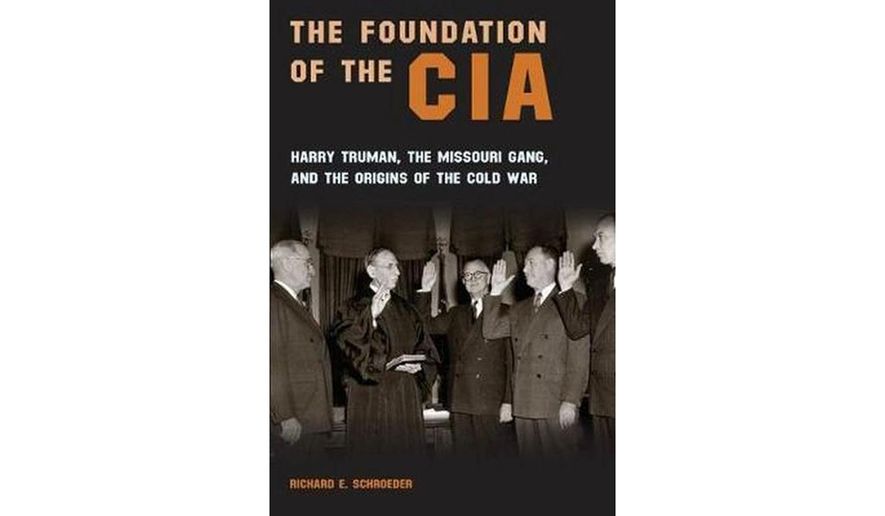OPINION:
THE FOUNDATION OF THE CIA: HARRY TRUMAN, THE MISSOURI GANG, AND THE ORIGINS OF THE COLD WAR
By Richard E. Schroeder
University of Missouri Press, $24.95, 175 pages
Although Harry S. Truman ranks high on my list of admired presidents, one of his earliest decisions was an outright blunder — but fortunately, one that he quickly corrected.
No sooner had the guns of World War II fallen silent than Mr. Truman disbanded the Office of Strategic Services (OSS), created as America’s first attempt at a unified intelligence organization.
The 1,655 member OSS research and analysis staff was shuffled off to an unwelcoming State Department. The 9,000 persons working in espionage and counterintelligence went to the Army.
The OSS’ wartime successes fell victim to Washington bureaucratic jealousies, from both J. Edgar Hoover of the FBI and the military services. Mr. Hoover especially objected to the rival agency.
Sensing that OSS faced a bleak post-war future, Director William Donovan had convinced President Franklin Roosevelt that the need for centralized intelligence would continue in peace. He wrote a plan for an independent intelligence authority under presidential supervision.
Critics pounced. The anti-FDR Chicago Tribune columnist Walter Trohan — to whom the plan was leaked — claimed that Donovan planned a “super Gestapo agency.” There was another factor: An early CIA historian wrote that Roosevelt likely had grown “weary and disenchanted with the flamboyant and ambitious Donovan.”
But even Mr. Truman’s naval aide, Clark Clifford, a fellow Missourian who became a Washington lawyer/wise man, felt that HST acted “prematurely, abruptly and unwisely” in terminating OSS. Mr. Clifford would write in his memoir that Mr. Truman was “persuaded by bitter critiques from army intelligence inspired by jealousy.”
Retired CIA officer Richard E. Schroeder relates how Mr. Truman moved to create a new intelligence organization from the wreckage of OSS and replaced it, first with the Central Intelligence Group (CIG) and then the Central Intelligence Agency. By coincidence, the chief players in the revival hailed from Mr. Truman’s home state:
In addition to Mr. Clifford, “The Missouri Gang” included one-time grocery chain executive Sidney Souers, a wartime rear admiral and intelligence officer; and a career naval officer, Adm. Roscoe Hillenkoetter, who had long experience in intelligence.
The first move, a stopgap, was the creation, by presidential order, of the Central Intelligence Group, initially headed by Mr. Souers. Thus Mr. Truman was given a single agency to produce what he called his “daily newspaper.”
HST staged a mock ceremony welcoming CIG, designating Adm. William Leahy, his chief military adviser, as “Personal Snooper” and Mr. Souers as “Director of Centralized Snooping.” “He then presented them with black hats, cloaks, and wooden daggers, adding a fake moustache for Leahy.”
But the CIG proved to be little more than a small planning staff which was “dependent on hostile rivals for both personnel and funding.”
Thus the White House indulged a form of covert activity to solve the problem. In the late 1940s Congress set out to unify the national security establishment under a strengthened Joint Chiefs of Staff.
At a late date, the military realized that the White House — specifically, Clark Clifford — “had slipped a brief section creating the Central Intelligence Agency” into the National Security Act of 1947. (For the record, both Mr. Truman and Mr. Souers denied any such subterfuge; Mr. Schroeder seems to believe the opposite.)
One key section undeniably came from Mr. Clifford, what he called a “carefully phrased catchall directive well understood by both the President and a handful of the most powerful congressional leaders.” The section directed that the CIA “shall perform such other functions and duties relating to intelligence affecting the national security of the United States as the [president’s] National Security Council may from time to time direct.”
According to Mr. Clifford, the CIA could therefore carry out the same propaganda and sabotage operations as had the OSS — and that the Soviet Union and China were using against the U.S.
The language satisfied such congressional barons as Speaker of the House John McCormick, who said that “those in charge are doing what they ought to do for the country. I would not want to know all about it.”
In later years, Mr. Clifford’s “catchall” language was decried by congressmen who accused the agency of bypassing their approval of scores of controversial activities. (Several CIA officers who handled legislative matters over the years — including founding father Walter Pforzheimer — told me that key congressmen “made plain they did not want to know” about covert activities.
Creation of CIA added another Missourian to the mix: Lawrence Houston, from St. Louis, the agency’s general counsel until his retirement in 1973. And in due course Mr. Hillenkoetter became director of central intelligence.
What Mr. Schroeder calls “the last word” on Mr. Truman’s CIA is in his handwritten note on the first floor of CIA headquarters: “To the Central Intelligence Agency, a necessity to the President of the United States, from one who knows.”
• Joseph Goulden writes frequently on intelligence and military matters.




Please read our comment policy before commenting.